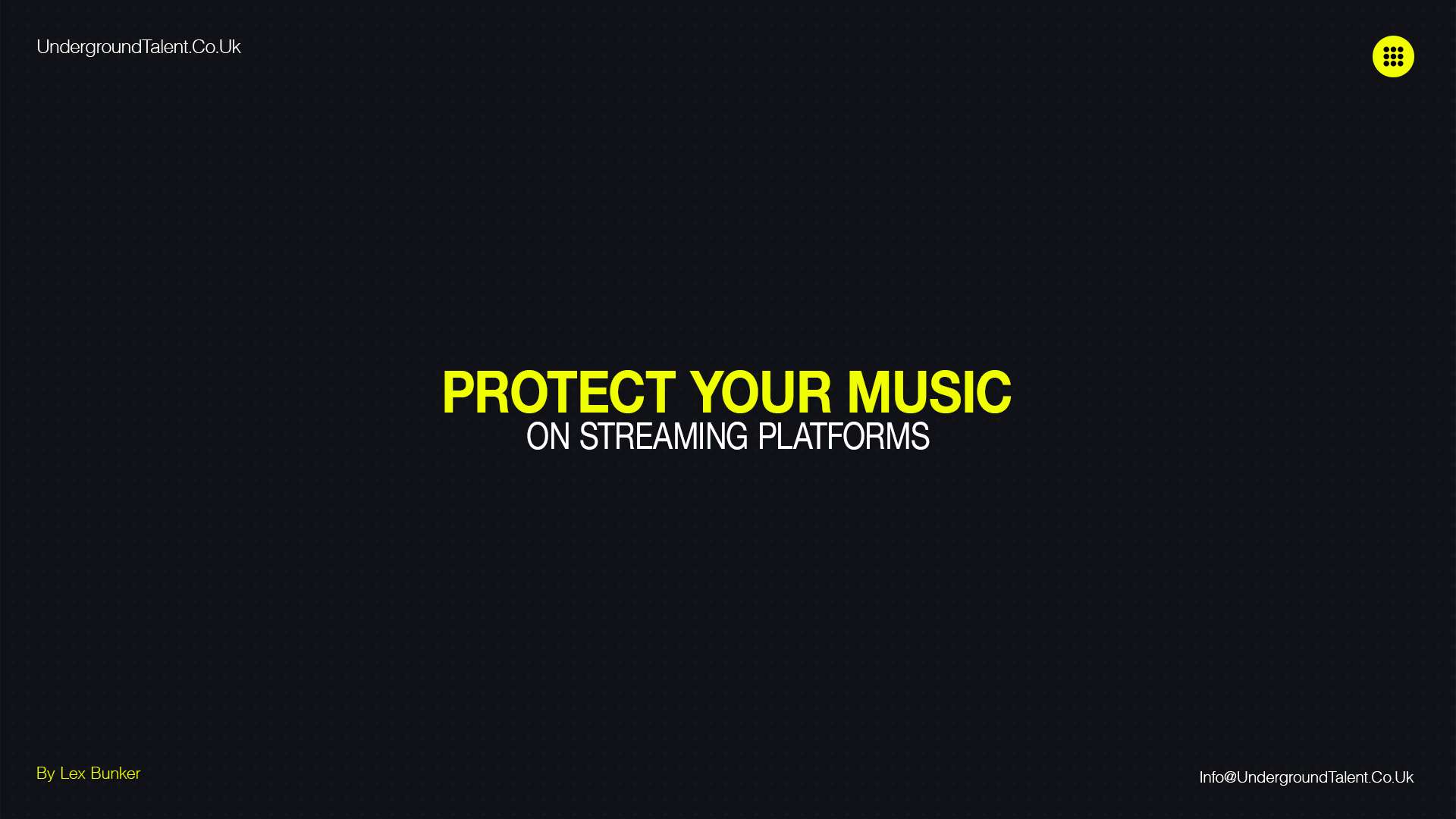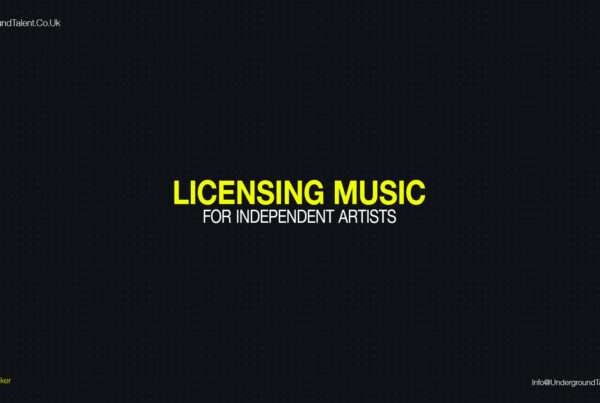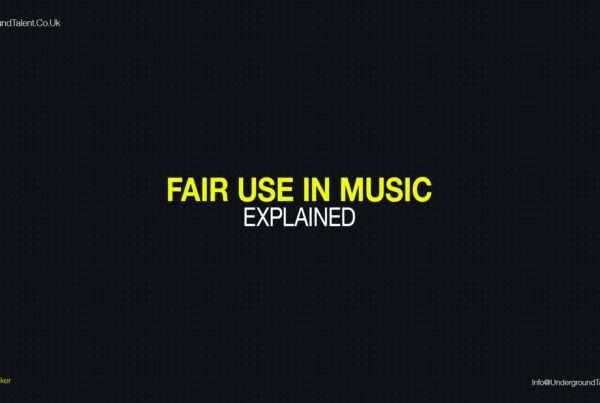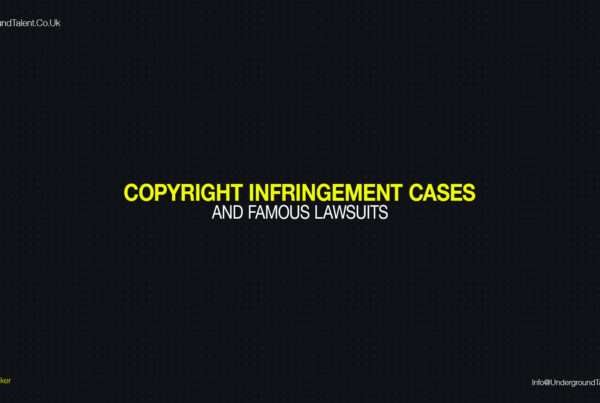Introduction to How to Protect Your Music on Streaming Platforms
Protecting your music on streaming platforms is more important than ever. With the rise of online streaming, musicians face new challenges in safeguarding their work from unauthorized use and ensuring they receive fair compensation. This guide will walk you through the essential steps to protect your music on streaming platforms, from understanding copyright laws to implementing secure payment systems.
Key Takeaways | Protect Your Music
- Understanding copyright laws is crucial for protecting your music on streaming platforms.
- Secure payment systems build customer trust and protect sensitive data.
- Regular audits and compliance checks help maintain the integrity of your streaming service.
- Educating users about copyright compliance can prevent unauthorized content uploads.
- Future trends like blockchain could revolutionize royalty payments and content identification.
Understanding Copyright Laws for Music Streaming | Protect Your Music
Key Copyright Concepts
Music copyright grants exclusive rights to creators, allowing them to control the reproduction, distribution, and public performance of their works. This means that only the copyright holder can decide how their music is used and who can profit from it. Understanding these basics is crucial for anyone involved in music streaming.
Importance of Copyright Compliance
Complying with copyright laws is essential to protect the interests of artists, songwriters, and record labels. Without proper compliance, the music industry would struggle to function fairly and sustainably. Copyright compliance ensures that creators are compensated for their work, which encourages further innovation and creativity.
Legal Consequences of Infringement
Failing to comply with copyright laws can lead to severe legal consequences. Unauthorized use of copyrighted music can result in hefty fines and legal action. For instance, musical works are subject to compulsory licensing, meaning that to reproduce a musical work, a person does not need to get permission from the musical work’s creator, but they must still pay royalties. This ensures that creators are fairly compensated even when their work is widely used. Explore real-world examples in Music Copyright Infringement Cases & Famous Lawsuits.
Understanding and adhering to copyright laws is not just a legal obligation but also a way to support and sustain the music industry.
Implementing Secure Payment Systems
Ensuring secure payment systems is crucial for music streaming platforms to build customer trust and loyalty. Encryption is essential for protecting sensitive payment information during transmission and storage. This prevents data like credit card numbers from being stolen or misused.
Encryption and Data Protection
All payment data should be encrypted to safeguard it from theft or misuse. This includes both data in transit and data at rest. Implementing robust encryption protocols is a fundamental step in protecting user data.
Compliance with PCI DSS
Music streaming platforms must comply with the Payment Card Industry Data Security Standard (PCI DSS). This standard sets the security requirements for handling, storing, and transmitting customer payment data. Compliance ensures that the platform meets the necessary security benchmarks.
Fraud Prevention Tools
To minimize fraudulent transactions, platforms should use tools that detect and block suspicious activities. Technologies like 3D Secure and CVV codes add extra layers of security. Continuous monitoring for threats like malware and phishing attacks is also essential.
By following these practices, music streaming platforms can ensure secure and efficient payment processing, which is vital for maintaining user trust and platform integrity.
User-Generated Content and Copyright Liability | Protect Your Music
Music streaming platforms that allow users to upload and share their content face potential copyright liability for any unauthorized or infringing material. Even if the platforms are not directly distributing the infringing content, they can still be held contributorily or vicariously liable. Delve into detailed techniques and copyright management in Music Sampling Techniques: A Complete Guide.
Identifying Unauthorized Content
To reduce this risk, streaming platforms must implement measures to identify unauthorized content uploaded by users. This includes content identification systems that can fingerprint and match audio to licensed tracks in real time. Any content that cannot be verified as properly licensed should be blocked from streaming until the rights holder can be contacted for validation.
Consequences for Repeat Offenders
Repeat offenders among uploaders should face consequences like account suspensions. Clear terms of service that prohibit uploading unauthorized content and warn users of potential legal penalties are essential. Users are asked to warrant that they have the right to upload any shared material.
DMCA Takedown Policies
Transparent DMCA takedown policies and rights holder reporting mechanisms enable copyright holders to notify the app of any infringing content so it can be removed expediently.
Music streaming apps must navigate the complexities of rights management to monetize music in user-generated content effectively.
Regular Auditing and Compliance Checks
To ensure security and ongoing copyright compliance, music streaming apps must implement regular auditing and review procedures. This involves both internal checks within the company and external audits by independent parties.
Educating Users on Copyright Compliance | Protect Your Music
Clear Terms of Service
Streaming platforms must have clear terms of service that outline what constitutes legal and authorized usage. These terms should prohibit activities like sharing account logins, downloading tracks for unauthorized distribution, and converting audio to unlicensed formats. Users must always appropriately attribute the copyrighted material they use, ensuring they respect the rights of the original creators.
In-App Notifications
Periodic in-app notifications can remind users about the importance of respecting copyright laws. These notifications can be pop-up messages or on-screen banners that highlight key points about legal usage and the consequences of infringement.
Email Campaigns
Email campaigns are another effective way to educate users. Streaming platforms can send occasional emails that remind users about the importance of complying with terms of use, how their subscriptions benefit artists, and the potential consequences of unauthorized use. This helps keep the issue of copyright compliance at the forefront of users’ minds.
Removal of Infringing Users
Platforms should have policies in place to identify and remove repeat infringers. This protects the rights of content creators and serves as a deterrent to other users. Copyright infringement is rampant, and taking action against violators helps maintain the platform’s integrity.
Information Centers
Maintaining an information centre or help page with clear explanations of what constitutes legal and proper use of the service can be very helpful. These resources should cover topics like how to avoid copyright infringement in music and the legal consequences of unauthorized use. This ensures that users have easy access to the information they need to stay compliant.
By combining these educational strategies, streaming platforms can foster a culture of respect for copyright laws, benefiting both users and content creators. Explore practical tips and educational resources in Techno Music Production: How to Master the Craft.
Future Trends and Challenges in Music Streaming | Protect Your Music
As music streaming continues to grow, the industry faces both exciting opportunities and significant challenges. Technological advancements and new business models will shape the future of music streaming. Stay informed about industry developments in How to Start a Record Label – The Ultimate Techno Guide.
Advancements in Content Identification
Content identification systems are expected to improve through machine learning and AI. These technologies will help in more accurately recognizing all versions of tracks in real-time. This will be crucial for maintaining copyright compliance and ensuring that artists get their due royalties.
Blockchain for Royalty Payments to Protect Your Music
Blockchain technology may be leveraged to securely track music streams and facilitate royalty payments. This could increase transparency and ensure that artists are compensated fairly. The use of blockchain can also help in reducing disputes over royalty payments.
Evolving Licensing Structures to Protect Your Music
Licensing structures may evolve to account for different streaming tiers and business models like ad-supported services. This will require ongoing negotiations between streaming platforms and rights holders to ensure that all parties are fairly compensated.
As these trends develop, they will shape the future of the industry, offering both challenges and exciting opportunities for all involved.
However, challenges will remain around preventing unintentional infringement through user uploads and ensuring that licensing covers new streaming models and technologies. Ongoing legal disputes and differences of opinion between rights holders and streamers will also need resolution.
Securing User Data and Privacy | Protect Your Music
Protecting user data and privacy is crucial for any online service or mobile app. Users trust companies with their personal information, passwords, financial data, messages, and other sensitive details. It is essential companies secure this data properly to maintain that trust.
Data Encryption to Protect Your Music
Companies should follow security best practices like encrypting sensitive data both in transit and at rest. They should conduct regular security audits and leverage tools that detect vulnerabilities. User passwords should be stored using secure hash functions, and two-factor authentication can provide another layer of security.
User Control Over Data to Protect Your Music
A music streaming app development company should only collect the minimum amount of user data necessary. They should be transparent about what data is collected, how it is used, and with whom it is shared. Users should have control over their data through settings and the ability to request data deletion.
Incident Response Plans to Protect Your Music
In the event of a data breach, companies have a responsibility to notify affected users promptly. They should also outline steps taken to prevent future breaches and mitigate potential impacts.
Securing user data and privacy is not just about technology but also about trust. Users need to feel confident that their information is safe.
To secure your streaming service accounts, always use strong, unique passwords to prevent unauthorized access. Additionally, always use secure, private Wi-Fi networks when streaming.
Licensing Music for Streaming Services | Protect Your Music
Licenses give streaming services the legal right to stream and make available copyrighted music on their platforms. They determine how much royalty fees need to be paid based on how the music is used. Music streaming app development services typically obtain two main types of music licenses. For more details on licensing and protecting your music rights, see Licensing Your Music: A Complete Guide for Independent Artists.
Content Identification and Recognition Systems | Protect Your Music
Music streaming apps use content identification and recognition systems to ensure they only stream licensed music and comply with copyright laws. These systems work by analyzing the audio “fingerprint” of each song. They break down the song’s waveform into perceptual features that form a unique fingerprint.
When new audio is uploaded or streamed on the service, the identification system extracts an audio fingerprint and searches for a match in its database of licensed content. If a match is found for a licensed track, the song is allowed. But if no match is found, the song is flagged as potentially unlicensed and blocked from streaming.
Some identification systems can recognize music even when the audio has been altered to some degree. They can identify most cover versions and remixed tracks based on the underlying composition. The identification databases are constantly updated as streaming services obtain new licenses and add more tracks. Any previously unmatched audio is then checked again.
Content identification helps music streaming apps maintain accurate royalty payments by tracking actual streams of licensed music. It also ensures a quality experience for users by filtering out unlicensed tracks.
For security and copyright compliance, identification of both uploaded user content and streams in real-time is important. Systems that can analyze audio fingerprints quickly and accurately are crucial to the legal and sustainable operation of music streaming apps.
Anti-Piracy Measures in Music Streaming Apps | Protect Your Music
Music streaming apps use various methods to fight illegal music piracy and protect copyrighted content. These anti-piracy measures help ensure security, compliance, and sustainable revenue streams for the music industry.
Digital Rights Management
Digital Rights Management (DRM) technologies restrict access to streams to only authorized, paying users of the service. DRM controls what users can do with streamed content, like limiting downloads.
Monitoring User Activity
Music streaming apps monitor user activity for suspicious patterns that indicate potential piracy. This includes abnormally high streaming times, large volumes of downloads, and streams from unusual locations.
Educating Users on Piracy
Piracy education is conducted to explain to users why compensation for artists and rights holders depends on legal streams through authorized services.
Effective anti-piracy measures are crucial in safeguarding the rights of creators and ensuring the integrity of the digital economy.
Collaborating with Music Industry Stakeholders | Protect Your Music
Working with Record Labels
Music streaming services must work closely with record labels to get the right licenses for the music they offer. This includes both major and indie labels. By collaborating, they can resolve any copyright issues that come up and ensure that artists are paid fairly.
Partnerships with PROs
Streaming services need to get public performance licenses from Performing Rights Organizations (PROs) like ASCAP and BMI. These organizations help by collecting royalties and making sure that songwriters and composers get paid. They also help identify sound recordings more efficiently, easing the flow of royalties.
Engaging with Artists and Songwriters
Streaming services often work directly with artists and songwriters to fill any gaps in licensing. This ensures that creators are compensated fairly for their work. Authentic collaborations can introduce artists to new listeners and help them grow their fanbase.
To navigate the digital era of music royalties effectively, it is crucial for various stakeholders, including artists, to collaborate responsibly and embrace emerging solutions.
Industry Groups
Streaming services also participate in industry groups that focus on licensing standards, data sharing, and copyright enforcement. This helps develop best practices and ensures that everyone in the industry is on the same page.
By working together, streaming services and music industry stakeholders can create a fair and sustainable ecosystem for everyone involved.
Conclusion: How to Protect Your Music
Protecting your music on streaming platforms is crucial for maintaining your rights and ensuring fair compensation. By implementing secure payment systems, adhering to copyright laws, and educating users, you can create a safer environment for both artists and listeners. Regular audits and collaborations with industry stakeholders further enhance the security and compliance of your platform. As technology evolves, staying informed and proactive will help you navigate future challenges and continue to support a thriving music ecosystem. Remember, safeguarding your music not only protects your work but also contributes to a fair and sustainable industry for all.
Frequently Asked Questions: Protect Your Music
How can I protect my music on streaming platforms?
To protect your music on streaming platforms, register your work with the U.S. Copyright Office, use digital rights management (DRM) tools, and monitor for unauthorized use. Always read and understand the platform’s terms and conditions.
What are the legal consequences of copyright infringement?
Copyright infringement can lead to serious legal consequences, including fines, lawsuits, and the removal of your content from the platform. In severe cases, it can also result in criminal charges.
Why is encryption important for payment systems?
Encryption is crucial because it protects sensitive payment information, like credit card numbers, from being stolen or misused. It ensures that the data is safe during transmission and storage.
What is a DMCA takedown policy?
A DMCA takedown policy allows copyright holders to request the removal of infringing content from a platform. It helps protect the rights of content creators by ensuring that unauthorized content is quickly taken down.
How do content identification systems work?
Content identification systems work by analyzing the audio ‘fingerprint’ of a song and matching it against a database of licensed tracks. If a match is found, the song is allowed to stream; if not, it may be blocked.
What are the types of music licenses needed for streaming?
For streaming, you typically need mechanical licenses, which cover the reproduction and distribution of music, and public performance licenses, which allow the music to be played publicly.
How can users be educated about copyright compliance?
Users can be educated through clear terms of service, in-app notifications, and email campaigns. These methods help inform users about the importance of respecting copyright laws and the consequences of infringement.
What are the future trends in music streaming?
Future trends in music streaming include advancements in content identification, the use of blockchain for royalty payments, and evolving licensing structures to accommodate new business models and technologies.
Additional Resources
- Mixing Electronic Music: Fundamentals and Objectives
Electronic Music Promotion – Unlock Massive Growth with Hypeddit
Producing Techno? Get Your Free Sample Packs.
Dive into electronic music production with our newly released “Free Techno Tools V1” and “Free Techno Tools V2” sample packs. These packs are full of high-quality sounds that will add a professional touch to your tracks. If you’re looking to expand your sound library, these free sample packs are perfect for every techno fanatic. Click on the links below to access these fantastic resources and elevate your production game today!
Connect With Us.
Join our vibrant community for more wisdom and updates:
And Always Remember…
Have Fun & Be Creative!





